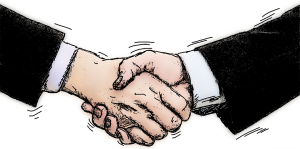As humans we are negotiators, constantly influencing others or being influenced. The lead negotiator behind the Frontier Project hopes to continue investigating global market opportunities and providing negotiation support to clients that face obstacles.
The SXSW Interactive panel “Cartography of Negotiation” features the lead negotiator of The Frontier Project, Scott Wayne. According to Wayne, negotiation is all about knowing your audience.
Being able to see the world as the other person sees it is vital.
Stepping into the other person’s shoes opens up possibilities in negotiation to not only understand their perspective but use that as an advantage.
“Most people sell for the majority of their life, instead of negotiate.”
In most dating apps such as Tinder, E harmony and Match.com users sell their assets rather than negotiate them. They examine what it is they want to sell (what they mention about themselves) and what is in demand (what are others are looking for). If instead they used a “negotiation theory,” they would do trade offs between what is most important and least important.
With the “trade off model” you go back and forth. “If having a man that is 6’3 was something you wanted but it was less important you would trade it off with having a guy that has a graduate degree in English literature for instance.”

In Wayne’s recent book, “Cartography of Negotiation,” he emphasizes separating position and interest. Many people are unaware of the difference so let’s think about this for a second.
“If I ask you your position on gun control you are thinking about your view and reaction to it, whatever that might be. If you ask a group of Americans if they believe a group of children should be safe in schools, then everyone is going to believe in that interest. So the form of whether you believe in gun control or not that is your position but our common interest is our students being safe in schools. Once we focus on our interests then we can start working with people that we socially disagree with.”
Finding common ground for a discussion eases the process of negotiating a solution to a problem.
“You never want to win outright or annihilate the other person if you want to have a relationship with them afterwards.”
We all face obstacles and challenges that alter our approach and our way of thinking. Uptight conference rooms pressure some into a deal, but the best deals are made when the individuals are comfortable and relaxed – not thinking of it as a deal but as a time to reflect. The environment you negotiate in plays a huge factor in coming to an agreement.
“Getting outside of a routine environment can change behaviors on how one views certain things.”
In his panel Wayne will expand on shaping the dynamics of communication, responding with ease to obstacles, having mutual respect for those one is negotiating with and so much more. Attendees will walk out of the panel with a new perspective on the practice of negotiation.
Friday, March 11
5:00 p.m. – 6:00 p.m.
JW Marriott
Salon 6
110 E 2nd St

